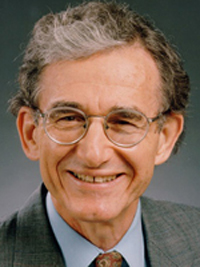Press Release: Legacy of Beloved Carnegie Mellon Professor Lester Lave To Live on Through Professorship and Fellowship
Contacts: Chriss Swaney / 412-268-5776 / swaney@andrew.cmu.edu
Mark Burd / 412-268-3486 / mdburd@andrew.cmu.edu
 PITTSBURGH—The legacy of visionary researcher Lester B. Lave will be honored by the establishment of a professorship in economics, engineering and public policy, and a fellowship for doctorial studies on innovative areas in economics, public policy and engineering at Carnegie Mellon University.
PITTSBURGH—The legacy of visionary researcher Lester B. Lave will be honored by the establishment of a professorship in economics, engineering and public policy, and a fellowship for doctorial studies on innovative areas in economics, public policy and engineering at Carnegie Mellon University.
"We acknowledge with deep gratitude the generous commitment from Lester and Judith Lave to establish separate endowed funds for the Lester and Judith Lave Professorship in Economics, Engineering and Public Policy, and the Lester and Judith Lave Fellowship in Economics, Engineering and Public Policy," said Mark S. Kamlet, provost and executive vice president at Carnegie Mellon. "This is a wonderful way to pay tribute to a remarkable professor and university icon."
Lave, one of the nation's leading environmental economists, died May 9, 2011, at his home after a four-month struggle with cancer. He was 71. His widow, Judith, is a professor of health economics and former chair of the Department of Health Policy and Management at the University of Pittsburgh.
In recent years at CMU, Lave devoted much of his attention to two problems: green design and the improvement of electricity systems. With colleagues Chris Hendrickson, H. Scott Matthews and Mike Griffin, he helped to build an economy-wide approach (EIO/LCA) to life cycle analysis. And with colleague M. Granger Morgan, he founded the university's Electricity Industry Center, and worked extensively on problems in that industry with Alex Farrell, Marija Ilic, Jay Apt and others.
"His work will go on as doctoral students will continue to work on the same kind of problems with the help of this new endowed professorship and fellowship," said Morgan, a University Professor and head of CMU's Department of Engineering and Public Policy. "His legacy is the impact through his students and the new ways they'll think about important issues."
The gift will be used to establish a fund to create and support an endowed professorship with a joint appointment between CMU's Tepper School of Business and the Department of Engineering and Public Policy in the College of Engineering. The holder of this new faculty chair will be expected to be an accomplished scholar with a strong background in engineering or the natural sciences, and a doctorate in economics with a special interest in public policy issues.
In addition to the professorship, the Lave family gift also provides for a fund that will be used to support and sustain a fellowship in doctoral studies on new and innovative research areas in engineering and public policy.
"Lester Lave was famous for taking risks and going against conventional wisdom," said Matthews, a student of Lave's in the early 1990s and now a CMU professor in civil and environmental engineering and engineering and public policy. "He taught us that if you are making the easy decision, it is probably a short-term decision. The good, hard decisions often mean taking risks and not following the pack," Matthews said.
"Lester decided early on that he was going to dedicate his career to using the tools of economics to solve problems that really matter to millions of people. He had a practiced eye for important issues, and applied clear and rigorous thinking to problems that ranged from air pollution to the value of cancer testing on rodents, to the structure of markets for electricity. He was comfortable writing clear, scholarly papers and pithy op-ed pieces, testifying before Congress or chairing a National Academies committee. He always counseled his students and colleagues to tackle important problems and when you are sure you are right never to bow to pressure," said Apt, director of the Carnegie Mellon Electricity Industry Center, and professor of technology in the Tepper School of Business and the Department of Engineering and Public Policy.
He first rose to prominence in the mid-1970s, when he and a doctoral student, Eugene Seskin, used statistical methods to demonstrate that air pollution in American cities was causing significant increases in the death rate. The book, "Air Pollution and Human Health," was contested by industry, but the findings were ultimately supported by subsequent research.
A beloved teacher and respected administrator, he served for eight years as head of Carnegie Mellon's Department of Economics and was an acting dean for the Tepper School of Business. His academic appointments spanned the Tepper School of Business, the Department of Engineering and Public Policy in the College of Engineering and the Heinz College. He also was an adjunct professor at the University of Pittsburgh and a senior fellow with the Brookings Institution.
Lave was past president of the Society for Risk Analysis. He was a member of the Institute of Medicine of the National Academies and served on and chaired many academy committees. He performed similar academic leadership roles for committees of the American Association for the Advancement of Science, the American Medical Association and the Office of Technology Assessment. He was a founding member of Pittsburgh's Group Against Smog and Pollution.
In 2010, he received the prestigious Richard Beatty Mellon Environmental Stewardship Award from the Air and Waste Management Association. The award is given to an individual whose contributions of a civic nature have aided in pollution control and for developing increased interest for the cause of air pollution control and waste management to improve the environment.
Born in Philadelphia, he grew up in southern California. Lave studied economics at Reed College in Portland, Ore., and the Massachusetts Institute of Technology before earning a doctorate at Harvard University in 1963.
###